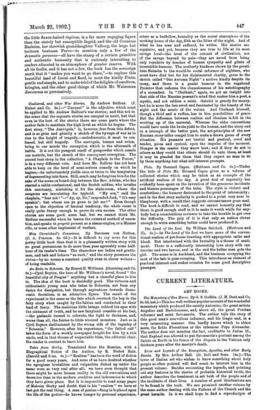Tales from Gorky. Translated from the Russian, with a Biographical
Notice of the Author, by R. Nisbet Bain. (Jerrold and S,ne. 6s.)—"Realism" has been the word of fiction for a good many years. And some of us have doubted whether the egregious brutalities and vulgarities dished up under the name were so very real after all; we have even thought that there might be more human reality in the old conventions and decencies than in the modern crudities and indecencies to which they have given place. But it is impossible to read many pages of Maksim Gorky and doubt that in his " realism " we have at last got the real thing. A man of genius—flung in boyhood upon the life of the gutter—he knows hanger by personal experience, crime as a bedfellow, brutality as the moral atmosphere of the working hours of the day, filth as the litter of the night. And of what he has seen and suffered, he writes. His stories are repulsive, and yet, because they are true to life at its most savage level—the level of the outcast of civilisation, not of the savage beyond its pale—they are saved from being only repulsive by touches of human sympathy and glints of irresistible humour. The motherly kindness shown by the prosti- tute Natasha to the would-be social reformer of eighteen, who must have died but for her disinterested charity, gives to the sketch called " One Autumn Night" a motive kindly despite its irony, and there is a genial humour in the vagabond Promtov that redeems the shamelessness of his autobiography of a scoundrel. In " Chelkash," again, we get an insight into that side of the Russian peasant's mind that makes him a poet, a mystic, and not seldom a saint. Gabriel is greedy for money, but he is none the less awed and fascinated by the beauty of the night and the music of the waters. And Chelkash himself, though a thief and a ruffian, has in him possibilities of grace. But the difference between realism and idealism is felt in the working up of the material. Whereas the older conventions would have made the brute yield to the human, and the story end in a triumph of the better part, the art-principles of the new Russian story-teller compel him to make a drawn game of every situation. His peasants are bestial and poetical, cruel and tender, pious and cynical, upon the impulse of the moment. Hunger is the master they know best; and if they do not to others as they would that others should do unto them, at least it may be pleaded for them that they expect no man to do by them anything but what self-interest prompts.










































 Previous page
Previous page